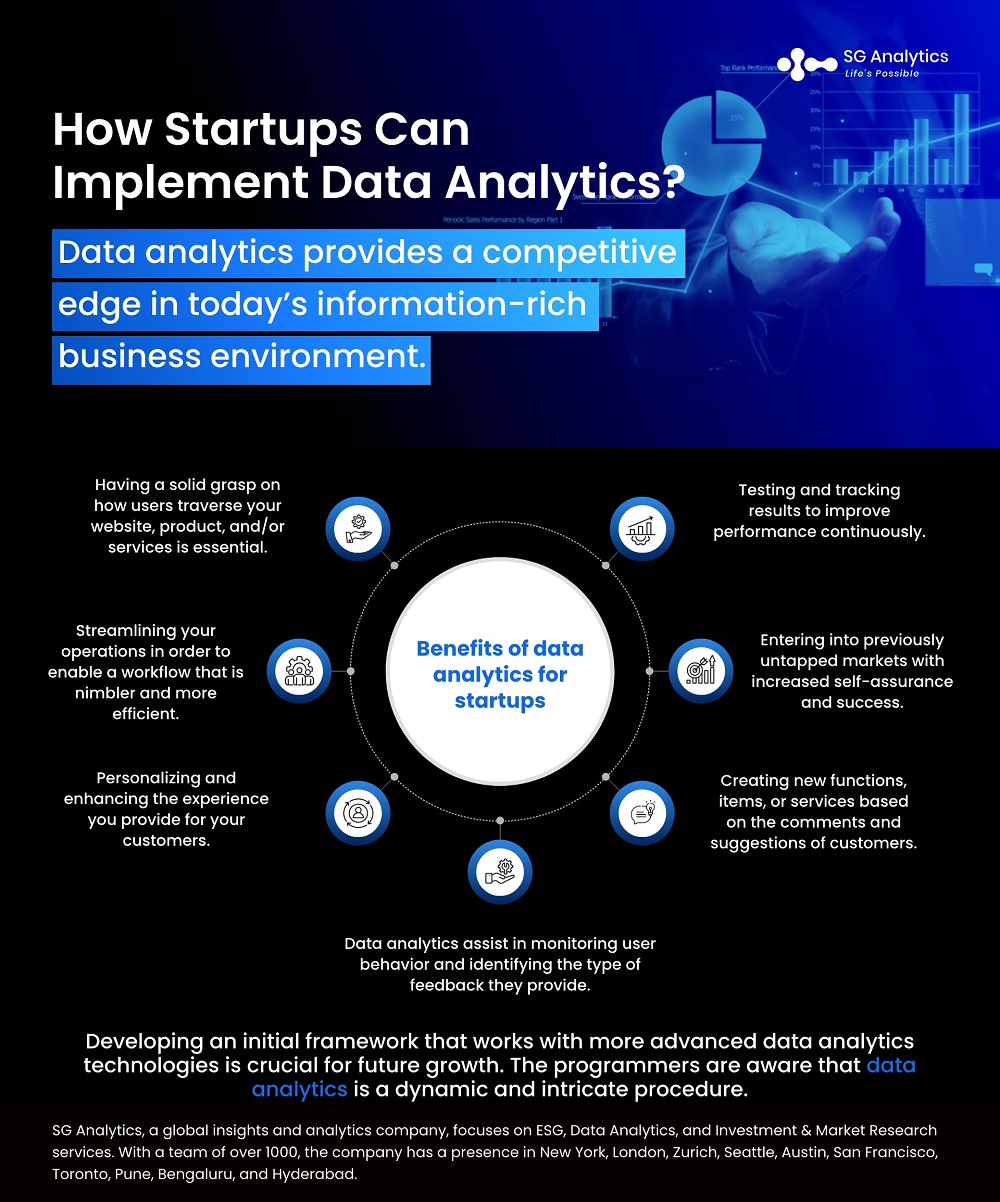Startup owners and entrepreneurs are typically too wrapped up in making their product work to devote much attention to data analytics. However, analytics can provide a firm with valuable insight into how to expand, who its customers are, and what they want, so abandoning them might not be the best idea.
It's hardly rocket science, but the procedure can seem daunting to first-time business owners. An organization's "must-have" list should always include up-to-date analytics, data science in startups, and other business analytics in startups and other firms.
Many questions remain unanswered and undiscovered while launching a brand-new company. Eliminating uncertainty and fueling business growth, data analytics in startups is a straightforward instrument. Implementing big data in startups can be beneficial to the growth of enterprises, allowing you to capture chances and make improvements to your company.
Data analytics provides a competitive edge in today's information-rich business environment. Businesses can benefit from data analytics solutions by gaining a deeper understanding of their data, and so being better positioned to seize opportunities as they arise. If done properly, data analytics has the ability to dramatically benefit your firm and improve decision-making across the board.
Even the most prosperous organizations face difficulties due to an abundance of data. It might be challenging to know where to start when it comes to implementing big data analytics in your firm.

What is Data Analytics?
Data analytics is the process of gathering, organizing, and analyzing data in order to identify patterns and trends. Data analytics in startups helps businesses make better decisions, streamline processes, and spot untapped opportunities.
Analytics can tell you how customers act, how sales are trending, and which marketing strategies are most successful. However, it is not sufficient to merely possess data. In order for organizations to realize the benefits of analytics, they must strategically and effectively employ data analysis.
Analytics implementation can be challenging for any company, but especially for those unfamiliar with the field. Fortunately, there are tools and resources out there that can assist businesses throughout this time.
Importance of Data Analytics
The startup world is both thrilling and draining. The sheer breadth of opportunity is both thrilling and dizzying. There are numerous moving parts, yet data analytics in startups and SMEs is often overlooked.
If you believe data analytics is something you can put off until the business is more established, you may find it challenging to get to that stage. Data analytics can provide valuable insights that could prove pivotal in advancing your business. You may utilize this data to answer crucial questions about your marketing, your users, your product, your productivity, and your customer service, among many other things.
Data analytics is less daunting now than it once was. To save you time and effort, our engineers have already developed the necessary code and tools for data collecting, allowing you to dive deeper than with Google Analytics alone. That's crucial if your startup doesn't have any whiz-bang technical minds on staff or if those minds are otherwise occupied, ensuring sure your product, website, or app is running smoothly.
Decisions made early on in regard to your technology stack will have lasting effects on data analytics both today and in the future.

Benefits of data analytics for startups:
-
Having a solid grasp on how users traverse your website, product, and/or services is essential.
-
Testing and tracking results to improve performance continuously.
-
Streamlining your operations in order to enable a workflow that is more nimble and efficient.
-
Entering into previously untapped markets with increased self-assurance and success.
-
Data analytics in startups can help you recognise patterns and trends in your data that you would not have otherwise been able to recognise.
-
Personalizing and enhancing the experience you provide for your customers.
-
Additionally, data analytics can help you determine which areas of your business are the most profitable and which require additional consideration.
-
Creating new functions, items, or services based on the comments and suggestions of customers.
-
Data analytics can also assist in monitoring user behavior and identifying the type of feedback they provide. This enables you to develop better products and services that satisfy their needs and exceed their expectations.
Getting Started with Data Analytics Implementation in Your Business
Get started by identifying the business problem you want to solve, followed by this six-step framework:
Identify your data analytics goals
Defining goals is an important first step since they will guide the entire data analytics process. Examples of data analytics goals include:
-
Bring all data into one place.
-
Make all data accessible to numerous team members.
-
Minimize data admin time.
-
Generate automated data reports.

In this phase, it's best to concentrate on getting the basics of your data analytics system set up. Once you have your data infrastructure in place, you may set additional objectives for using it, such as identifying user behavior trends that can guide product development.
Get Exec Buy-in
Getting higher management on board is the next step once you've established your goals and identified potential insights from data analytics. A startup has little chance of succeeding without the backing of higher-ups. Data analytics is a relatively easy sell because there is so much data that can be collected.
Before approaching the upper management, write a project overview. The stated objectives for the data analytics system, the contribution to business needs, the estimated effort, the estimated budget, and the list of persons working on the project should all be included in this overview.
Start Using the Basic Tools You Already Have
You probably have Google Analytics (GA) up and running, or you can do so in a couple of hours. It will provide you with some foundational knowledge from which to expand.
Having a customer relationship management system (CRM) gives you access to even more data that can be used for analysis. The sales team can monitor customer interactions, sales rep activity, and certain sorts of conversions with the help of a CRM's in-built reporting features.
If you don't have access to better tools, use what you have until you can locate one that can import the data properly.
Decide How Much Data Mining You Can Handle
You don't have time to install and run a complex business intelligence platform right now. You can't just sit around all day and analyze data in the early phases of a firm. Also, you probably don't have a data analyst on staff or the knowledge to make good use of the technology. Simple methods of data collection, storage, and analysis are necessary.

When you're just getting started, a SaaS ready-to-use analytics platform is the most efficient use of your time, money, and employees.
It will be more expensive than developing something in-house, but you can rest assured that the data is accurate, and the process of implementing it will be much simpler. Don't forget that investing in high-quality data analytics tools pays off handsomely. They are an investment that can boost your business's bottom line.
An analytics platform or system that can export data to Excel effortlessly is preferable from a usability and scalability perspective. Excel is useful for analyzing big volumes of data, but it is neither the simplest procedure or the most visual way.
Looking ahead, it's also important to think about how information may improve the performance of individual team members. Solutions should produce reports that even those who aren't data experts can understand and use.
Focus on Event and Product Metrics
It is absolutely essential to get accurate data for the best results. It all depends on the nature and stage of your business to determine the correct course of action. Depending on your startup's revenue model, event and product analytics are critical early on for iterative development.
For instance, it's crucial for e-commerce firms to have a complete purchase context. Startups in the software-as-a-service industry will need to carefully examine events to learn how users are interacting with their products.
Make Compatibility a Priority
Developing an initial framework that works with more advanced data analytics technologies is crucial for future growth. The programmers are aware that data analytics is a dynamic and intricate procedure.
The import of data for analysis is influenced by compatibility issues as well. You should consolidate as much relevant data as possible into a single analytics platform. You may develop your business without investing in new tracking systems, and you'll get the fullest possible image thanks to this method.
Also Read - What Is Data Democratization? How is it Accelerating Digital Businesses?

To Sum Up
Although data analytics isn't new, its popularity has recently increased, and businesses realize the need to incorporate it. It plays a crucial role in gathering big data for analysis, making decisions, and creating reports for businesses. Data analytics strategy is used by businesses to get an edge in decision-making and boost productivity.
Your startup can gain a competitive edge and a deeper understanding of the industry with the help of a data analytics strategy. However, you should spend money on the correct tools if you want to advance your analytical process.
Just a few months of focused effort will get you where you need to go. Then, using data analytics, you can keep tabs on your every move and spot patterns that will lead to outstanding performance.
Each bit of information, in our opinion, is special and has a secret purpose just waiting to be discovered. We are dedicated to maximizing the value of our clients' data through careful planning, sophisticated analytics, and state-of-the-art technologies, and we do so as a leading provider of data analytics services and solutions.
Our team is dedicated to maximizing the value of data by extracting meaningful insights that fuel organizational development and new product creation. We have the knowledge, experience, and resources to help you optimize your processes, enhance your customers' experiences, and discover untapped avenues of revenue generation.









